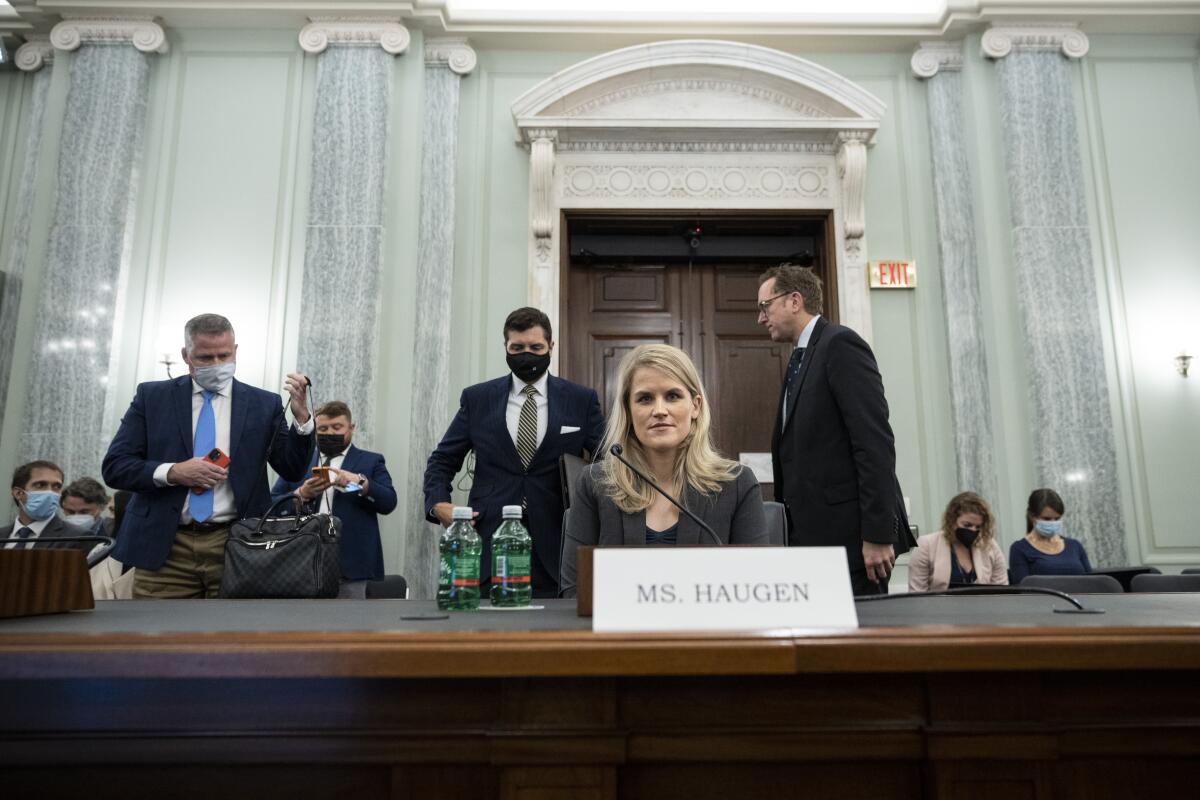Tech workers are no longer afraid to go public. Here’s how they found their voices

Silicon Valley has a powerful new adversary: its own workforce.
Attracted by high salaries, world-class perks and the promise of being able to make a positive difference in the world, employees of the biggest tech and internet companies have long ranked high on measures of job satisfaction and loyalty. But with their companies frequently at the center of contentious political and cultural struggles, they are increasingly concluding that doing good requires breaking with the corporate line — often publicly.
Recent episodes at Facebook and Netflix have seen tech workers taking problems with their employers outside the building — to the media, to the streets and to Capitol Hill — in ways that were rare just a few years ago.
“We are experiencing a major shift in work norms,” said Catherine Bracy, founder and chief executive of TechEquity Collaborative, an organization focused on mobilizing the tech sector to address economic inequity. “Executives and upper management often come from a tradition that expects workers to check their personal lives and opinions at the door. Rank-and-file workers, especially millennials and Gen Z-ers, aren’t willing to make those kinds of compromises.”
“We’re seeing that difference in expectation play out very publicly these days,” Bracy added via email.
The shift has been on full display in the “Facebook Papers,” a large-scale journalism project based on reams of previously internal Facebook documents made available by whistleblower Frances Haugen, a former product manager for the company. Haugen’s leaks have led to revelations about Facebook’s hesitancy to stifle the flow of anti-vaccine misinformation, its lack of local language content moderators and concerns flagged by Apple that it was being used to buy and sell Middle Eastern maids.
And Haugen isn’t the only Facebook worker who’s grown disillusioned; as the leaked documents reveal, employees have been taking to the company’s internal message board to voice concerns over the social network’s role in the Jan. 6 Capitol insurrection and other matters.
At Netflix, comedian Dave Chappelle’s latest stand-up special — a platform exclusive in which Chappelle made remarks many have condemned as transphobic — sparked the streaming giant’s first major public protest by employees.
Last week, transgender Netflix employees and their allies protested in Los Angeles with an organized walkout. Some staff members have also released a list of demands and (in a move that mirrors Haugen’s actions) one employee allegedly leaked financial data about Chappelle’s special to the media, resulting in the employee’s firing.
Google employees have agitated against company projects they disapproved of, and several hundred unionized. Amazon workers have spoken out against the company’s environmental and labor practices. Smaller, more under-the-radar tech companies — Hootsuite, Basecamp, Coinbase — have dealt with their own internal reckonings over conflicts between what workers want and what management demands.
Former Facebook manager Frances Haugen tells British lawmakers that the company’s algorithms help push people toward extreme views.
Tech workers turning to external channels to agitate for change represents a significant cultural shift for Silicon Valley, which has long prided itself on internal transparency and empowering individuals, and where rank-and-file workers once largely accepted the notion that frictionless internal collaboration and candid leadership required a commitment to keeping company secrets.
Those norms might have held when the companies employed a few thousand workers, said Adam Fisher, author of “Valley of Genius: The Uncensored History of Silicon Valley.” “But now that these are some of the biggest companies that have ever existed on the planet — at least by value, and probably by size; other measures too — it’s just harder to keep stuff secret.”
The value proposition has changed as well, with the companies’ need for talent giving tech workers “a lot of economic power,” Fisher said. “These companies don’t run themselves, and we’re at a place [where] you’ve got million-dollar signing bonuses for some of the hottest young engineers, literally, so you need to care about what they think, no matter what it is.”
Forrest Briscoe, a professor of management at Penn State, said that whistleblowing and demonstrations are “close cousins, with lots of theoretical overlaps” — but that the two strategies also have some differences.
“Activism more often involves collective action (but not always),” Briscoe said via email, whereas “whistleblowing more often involves misconduct/rule violation allegations (but not always).”
One can lead to the other, said Arunima Krishna, an assistant professor of public relations at Boston University whose work has explored employee activism.
“I think the major difference between what’s happening at Netflix versus Facebook, and why I’m less optimistic about the latter is that … Facebook’s situation to my mind is a failure to respond to employee activism, thus taking such activism to the next level, whistleblowing,” Krishna said via email. “Whistleblowing typically is a result of employee pushback against policies being ignored, forcing (former) employees to go public with allegations of wrongdoing.”
Just as employees have a spectrum of responses to choose from when faced with concerns or frustrations about their bosses, executives also have flexibility in how they respond to pushback.
Camille Reyes, an associate professor in the communication department at Trinity University, said the decisions that organizations make in crises exist along a “contingency continuum.”
At one end of that continuum is “accommodation,” Reyes said, when a company apologizes unequivocally or capitulates fully to employee-activist demands. At the other end is “advocacy,” wherein “the organization is going hard defending themselves.”
In its initial response to the protests over Chappelle, Netflix was on the advocacy end of the continuum, Reyes said, with corporate leadership sending out a memo saying the comedy special didn’t “directly translate to real-world harm.” Subsequently, Netflix has gradually shifted closer to the middle, “trying to build empathy” but still not fully embracing employee concerns, she said.
Facebook, by contrast, has “gone hard on the advocacy side.”
“They continue to attempt to discredit Haugen,” Reyes said. “In addition to attacking her as just a disgruntled ex-employee, their primary talking point with the mainstream media seems to be that the data points alleging Facebook misdeeds are cherry-picked, painting a false picture.”
Facebook has been cagey about whether it will retaliate against Haugen for whistleblowing.
It’s a risky strategy, however, and one which — more so than Netflix’s wavering but increasingly conciliatory approach — could hurt Facebook’s reputation in the long run.
“Based on our research of employee activism at Microsoft, Google, Amazon and Wayfair, being dismissive of employee demands and retaliating against employees are not the most effective tactics,” said Ed Carberry, associate professor and chair of the management department at the University of Massachusetts Boston, and Nishi Gautam, Carberry’s advisee and a doctoral candidate researching tech employee activism. “Generally, companies need to be careful to take these issues seriously, trust their employees when they say they have a problem and listen to them.”
It’s a dynamic that tech companies are having to think more and more about as their employees become increasingly comfortable airing dirty corporate laundry in public.
“Listen to your employees, listen to what’s important to them,” said Krishna, the Boston University assistant professor. “They want to have a voice in their organization, and are not afraid to use that voice against the organization if they believe that the organization’s values are not being followed.”








